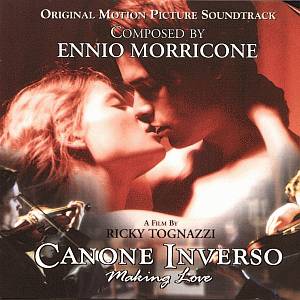The prominence of violinists and musicians in the album’s booklet art indicates that this Morricone score is very much in the classical music mould rather like his music for The Legend for 1900 (1999 –SONY SK66767 which I personally rated very highly in my year end assessment). Unlike the music for The Red Violin, Morricone’s music is uplifting and accessible, melodic and lyrical.
Intriguingly, the album commences with a brooding violin solo over distant voices intoning a folk melody before they fade and the fiddle sings its ‘Canto Inverso Primo’ theme plaintive song accompanied by a viola, harpsichord and strings. Heavy double bass
two-note chord patterns underline the following ‘Tema d’Amore Disperato’ hinting at emotional and external turbulences. ‘Finale di un "concerto romantico interrotto per violino" is a thrilling bravado concertino for violin and piano and orchestra with a terrific swift-paced tune. This track is worth the price of this CD alone.
Jolly folk music in the Italian mould comes with ‘Goliardi sport’ with a hint of menace. ‘Con disperata gioia’ is full of sweet yearning while ‘Intermezzo’ is a gentle but sad lullaby. ‘Nel campo’ develops the opening track theme and adds organ and other colourings. ‘Avvolgente’, with some intriguing echoing brass figures, signals darker material and suggests that love is crudely, brutally interrupted by the spectre (quite literally at one point) of war. (It is in one respect a sardonically witty parody of an ensemble’s tuning up process). But this 4-minute cue also includes some lovely elegiac material. That mood is shattered with the heavy martial tread of ‘Elmetti di fuoco’ slightly reminiscent of Ron Goodwin’s Where Eagles Dare music. ‘Vaghi Riflessi’ for solemn strings treads slowly, hesitatingly and tragically. ‘In bicicletta’ adds a wordless vocal to the simple lullaby.
Interspersed with Morricone’s original music is some source music including Morricone’s enchanting silvery arrangement of Debussy’s Clair de lune complete with bird-like twitterings. Then there are three violin solos of music by Paganini - ‘Capriccio "La caccia"’, Johann Sebasian Bach’s ‘Giaccona’; and Dvorak’s ‘Songs My Mother Taught Me’ (with piano). All three are showpieces for the violinists technique and expressive powers. ‘Corsa’ is Morricone giving his violinist the chance to throw off more fiddle pyrotechnics. ‘Piccoli studi’ is just that, a study piece for solo violin with the addition of piano as the music progresses – another tuneful bonus from Morricone. [As usual the booklet notes are too skimpy and we are left with no indication of the music’s derivation – one wonders if it began life as a piece of Morricone’s non film music?] ‘Goliardi’ finds the violinists letting their hair down as classical forms turn to jazz. ‘All’aperto’ is gypsy style romance and excitement that again presents opportunities for fiddle virtuosity.
A good old-fashioned romantic, melodic score; and, for classical music lovers, a real treat.
Ian Lace

Paul Tonks adds:-
Mixed reviews greeted this adaptation of the novel by Paolo Maurensig. It’s a romantic drama set around possession of a Steiner violin. Regardless of the reaction to the film, reaction to the score this material inspired from Morricone was unanimously praising. It won Best Score from the Italian National Syndicate of Film Journalists.
And that’s about all the info I’ve dug up on the movie. The booklet was certainly no help.
What can be stated unequivocally however is that for the most part this is a sumptuously beautiful album from the Italian maestro. Naturally there’s a prominent violin throughout, played with vigour and warmth by Gabriele Pieranunzi ("Piccoli Studi" is a great example). Other highlights include every appearance of the main theme in and following the opening "Canone Inverso Primo" and in a high-spirited jig within "Finale Di Un ‘Concerto Romantico Interrotto’ Per Violino, Pianoforte (In Canone) E Orchestra".
With "Avvolgente" we get the other side of Morricone – the unpredictable collision of martial rhythms and parping horns for high drama. There are a few of these types of cues. These prompt my comment about the album being sumptuously beautiful only for the most part.
The other standout moments for violin are for the source pieces: "Capriccio ‘La Caccia’" (Paganini), "Ciaccona" (Bach) and "Songs That My Mother Taught Me" (Dvorak). Like the dramatic cues, these really ought to have been re-sequenced to the end of the album so as not to interrupt the flow of Morricone’s overall romanticism.
Paul Tonks

